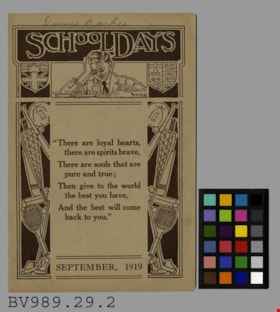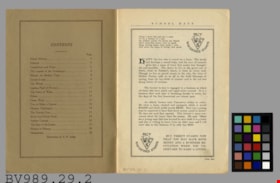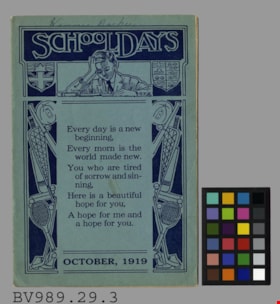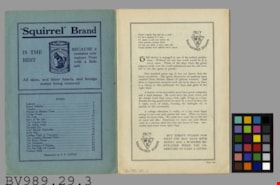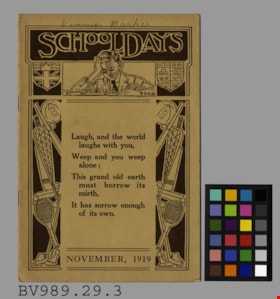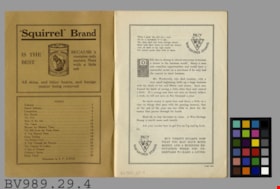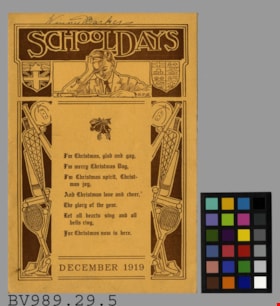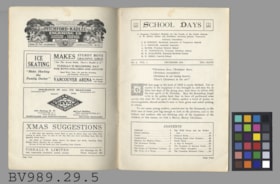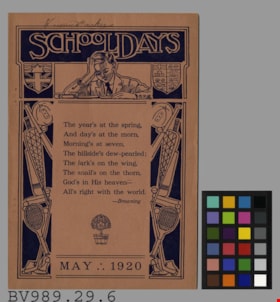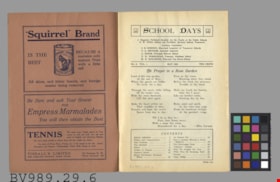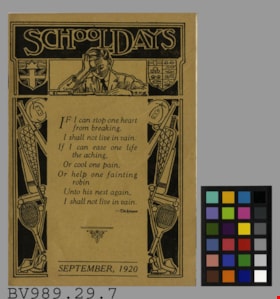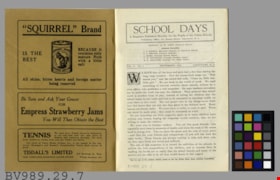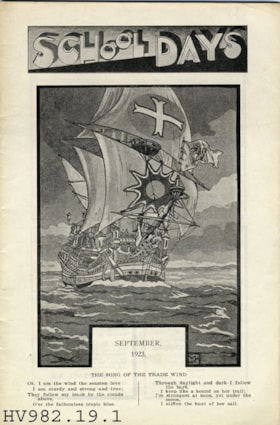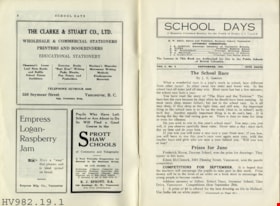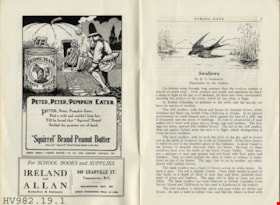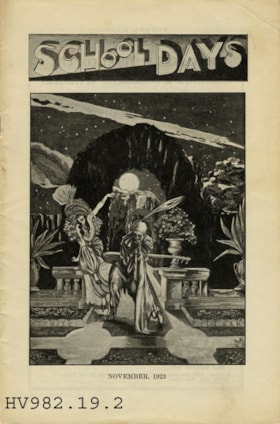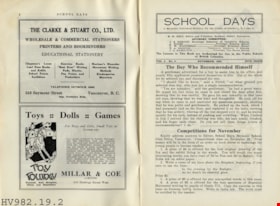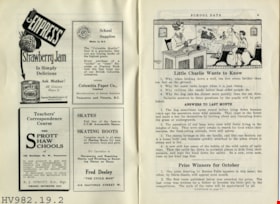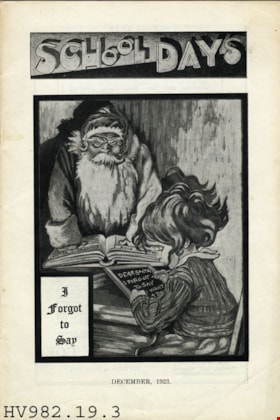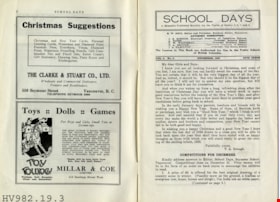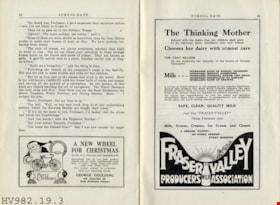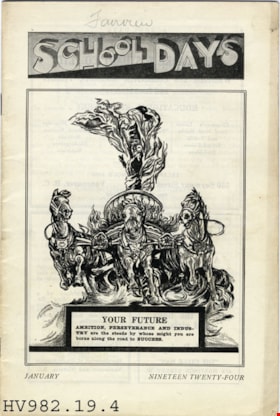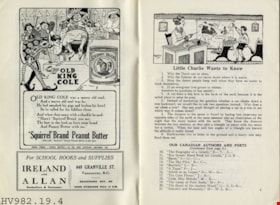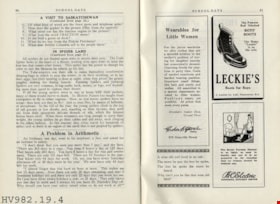Narrow Results By
Decade
- 2020s 16
- 2010s 24
- 2000s 28
- 1990s 32
- 1980s 34
- 1970s 34
- 1960s 32
- 1950s 24
- 1940s 18
- 1930s 12
- 1920s 8
- 1910s 4
- 1900s 4
- 1890s 2
- 1880s 1
- 1870s 1
- 1860s 1
- 1850s 1
- 1840s 1
- 1830s 1
- 1820s 1
- 1810s 1
- 1800s 1
- 1790s 1
- 1780s 1
- 1770s 1
- 1760s 1
- 1750s 1
- 1740s 1
- 1730s 1
- 1720s 1
- 1710s 1
- 1700s 1
- 1690s 1
- 1680s 1
- 1670s 1
- 1660s 1
- 1650s 1
- 1640s 1
- 1630s 1
- 1620s 1
- 1610s 1
- 1600s 1
Subject
- Accidents 3
- Accidents - Automobile Accidents 1
- Accidents - Train Accidents 1
- Adornment 7
- Adornment - Lapel Pins 8
- Advertising Medium 25
- Advertising Medium - Business Cards 9
- Advertising Medium - Flyer 1
- Advertising Medium - Signs and Signboards 39
- Aerial Photographs 21
- Agricultural Tools and Equipment 1
- Agriculture 11
Person / Organization
- Babey, Beverley 1
- Barnet Rifle Club 1
- Belhouse, Jack 1
- Blair, Betty Warburton Atkinson 1
- Blaney, Jack 1
- The Bollywood Boyz 1
- Bossort, Kathy 14
- Bridge Studios 1
- British Columbia Hydro and Power Authority 1
- Brown, Donald N. "Don" 1
- Burnaby Central Secondary School 1
- Burnaby Mountain Biking Association 1
Interview with Lee Rankin by Kathy Bossort December 2, 2015 - Track 6
https://search.heritageburnaby.ca/link/oralhistory647
- Repository
- City of Burnaby Archives
- Date Range
- 1973-2015
- Length
- 0:17:26
- Summary
- This portion of the interview is about Lee Rankin telling stories about various people, including Doug Drummond, the Barnet Rifle Range and Dr. Mauser, John Stubbs, and Jack Blaney. He also talks about the change in providing higher education from the full university experience to development of pa…
- Repository
- City of Burnaby Archives
- Summary
- This portion of the interview is about Lee Rankin telling stories about various people, including Doug Drummond, the Barnet Rifle Range and Dr. Mauser, John Stubbs, and Jack Blaney. He also talks about the change in providing higher education from the full university experience to development of part time and online courses and satellite campuses. He tells about presenting an idea to Jack Blaney for a satellite campus at Metrotown.
- Date Range
- 1973-2015
- Length
- 0:17:26
- Subjects
- Education
- Buildings - Schools - Universities and Colleges
- Transportation
- Recreational Activities
- Geographic Access
- Burnaby Mountain Conservation Area
- Interviewer
- Bossort, Kathy
- Interview Date
- December 2, 2015
- Scope and Content
- Recording is of an interview with Lee Rankin conducted by Kathy Bossort. Lee Rankin was one of 23 participants interviewed as part of the Community Heritage Commission’s Burnaby Mountain Oral History Project. The interview is mainly about Lee Rankin’s involvement in finding a resolution to the dispute between the City of Burnaby and Simon Fraser University over land ownership and control on Burnaby Mountain. He talks about the origin of the dispute, the positions taken by the two sides, the key people who brought about a resolution, and the main features of the agreement between the City, SFU and the province of BC. He talks about how the agreement met SFU’s goals, fostered trust between the City and university, and removed uncertainty from protecting parkland on Burnaby Mountain.
- Biographical Notes
- Lee Rankin was born in 1953 in Vancouver. He attended SFU 1973-78, completing his BA degree in 1985. He earned his law degree at UBC in 1988, was called to the Bar in 1989, and practiced in immigration and refugee law. Lee has lived in Burnaby since 1976 and was a member of Burnaby Council for 22 years, from 1983-1999 and 2002-2008. His particular interests as a Councillor were in community planning, housing and environment. Among other duties and accomplishments as Councillor, Lee served as chair of the Simon Fraser Liaison Committee and was involved in the negotiations with the province and SFU that resulted in the university returning more than 800 acres of land to the City, which was dedicated as part of the Burnaby Mountain Conservation Area. He has also served on the GVRD, volunteers as a coach for team sports in Burnaby, and has served on numerous community and business associations and committees. Lee is married to Ragini Venkat Rankin and has one son Henry.
- Total Tracks
- 8
- Total Length
- 1:50:35
- Interviewee Name
- Rankin, Lee A.
- Interview Location
- Lee Rankin's home in Burnaby
- Interviewer Bio
- Kathy Bossort is a retired archivist living in Ladner, BC. She worked at the Delta Museum and Archives after graduating from SLAIS (UBC) in 2001 with Masters degrees in library science and archival studies. Kathy grew up in Calgary, Alberta, and, prior to this career change, she lived in the West Kootenays, earning her living as a cook for BC tourist lodges and work camps. She continues to be interested in oral histories as a way to fill the gaps in the written record and bring richer meaning to history.
- Collection/Fonds
- Community Heritage Commission Special Projects fonds
- Media Type
- Sound Recording
Audio Tracks
Track six of interview with Lee Rankin
Track six of interview with Lee Rankin
https://search.heritageburnaby.ca/media/hpo/_Data/_Archives_Oral_Histories/_Unrestricted/MSS196-014/MSS196-014_Track_6.mp3Interview with Mary Lumby by Kathy Bossort January 8, 2016 - Track 1
https://search.heritageburnaby.ca/link/oralhistory671
- Repository
- City of Burnaby Archives
- Date Range
- 1965-2003
- Length
- 0:12:46
- Summary
- This portion of the interview is about Mary Lumby talking about her career as a teacher in Burnaby at Douglas Road, Suncrest and Stride schools, and her move to the Parkcrest neighborhood in Burnaby in 1977 and in 1983 to Forest Hills. She talks about visiting Burnaby Mountain Park and the Owl & Oa…
- Repository
- City of Burnaby Archives
- Summary
- This portion of the interview is about Mary Lumby talking about her career as a teacher in Burnaby at Douglas Road, Suncrest and Stride schools, and her move to the Parkcrest neighborhood in Burnaby in 1977 and in 1983 to Forest Hills. She talks about visiting Burnaby Mountain Park and the Owl & Oarsman restaurant, and the history of the development of Forest Hills in the 1980s.
- Date Range
- 1965-2003
- Length
- 0:12:46
- Geographic Access
- Burnaby Mountain Conservation Area
- Forest Grove Drive
- Planning Study Area
- Parkcrest-Aubrey Area
- Lake City Area
- Interviewer
- Bossort, Kathy
- Interview Date
- January 8, 2016
- Scope and Content
- Recording is of an interview with Mary Lumby conducted by Kathy Bossort. Mary Lumby was one of 23 participants interviewed as part of the Community Heritage Commission’s Burnaby Mountain Oral History Project. The interview is mainly about Mary Lumby’s experience living in Forest Hills, raising her children there, and her involvement in community groups and advocating for improved community services in the Forest Hills and Forest Grove neighbourhoods, and her later move to UniverCity. She talks about the history of the Forest Hills subdivision and what she liked about living there, its links with Forest Grove, and challenges facing both communities as a result of their isolation. Her description of living in UniverCity provides an interesting comparison in how community is created. Mary Lumby also talks about her teaching career, her volunteer activities especially related to the environment, the relationship Trans Mountain tank farm had with adjacent neighbourhoods when she lived in Forest Hills, and what the Burnaby Mountain Conservation Area means to her.
- Biographical Notes
- Mary Lumby was born in Vancouver B.C. She moved to Burnaby and the Parkcrest area in 1977, and then to the new Forest Hills subdivision. Later she moved into another developing community, UniverCity, at the top of Burnaby Mountain and adjacent to the Simon Fraser University campus. Mary has been an active community member, volunteer and community advocate. She has been particularly interested in environmental issues, as a teacher, volunteer coordinator for civic events, and citizen representative on Burnaby’s Environment Committee. She continues to be active in community affairs and enjoys living on Burnaby Mountain.
- Total Tracks
- 7
- Total Length
- 1:31:47
- Interviewee Name
- Lumby, Mary M.
- Interview Location
- Mary Lumby's home in Burnaby
- Interviewer Bio
- Kathy Bossort is a retired archivist living in Ladner, BC. She worked at the Delta Museum and Archives after graduating from SLAIS (UBC) in 2001 with Masters degrees in library science and archival studies. Kathy grew up in Calgary, Alberta, and, prior to this career change, she lived in the West Kootenays, earning her living as a cook for BC tourist lodges and work camps. She continues to be interested in oral histories as a way to fill the gaps in the written record and bring richer meaning to history.
- Collection/Fonds
- Community Heritage Commission Special Projects fonds
- Media Type
- Sound Recording
Audio Tracks
Track one of interview with Mary Lumby
Track one of interview with Mary Lumby
https://search.heritageburnaby.ca/media/hpo/_Data/_Archives_Oral_Histories/_Unrestricted/MSS196-016/MSS196-016_Track_1.mp3Interview with Merrill M. Gordon by Rod Fowler March 19, 1990 - Track 3
https://search.heritageburnaby.ca/link/oralhistory474
- Repository
- City of Burnaby Archives
- Date Range
- 1939-1946
- Length
- 00:04:30
- Summary
- This portion of the interview is about Merrill Gordon’s education at Templeton School (Gr. 7-9) and Grandview High School of Commerce on First and Commercial, his teachers and the courses that he took.
- Repository
- City of Burnaby Archives
- Summary
- This portion of the interview is about Merrill Gordon’s education at Templeton School (Gr. 7-9) and Grandview High School of Commerce on First and Commercial, his teachers and the courses that he took.
- Date Range
- 1939-1946
- Photo Info
- Burnaby Alderman Merrill Gordon (second from right) following a candidates' meeting, 1973. Item no. 480-263
- Length
- 00:04:30
- Subjects
- Education
- Interviewer
- Fowler, Rod
- Interview Date
- March 19, 1990
- Scope and Content
- Recording is of an interview with Merrill Gordon, conducted by Rod Fowler.Gordon Merrill was one of eleven participants interviewed as part of the SFU/Burnaby Centennial Committee's oral history series titled, "Voices of Burnaby". The interview is about Merrill Gordon’s childhood in the Depression, including his story about the family’s difficult trek to Burnaby from Alberta; his education, teachers and first volunteer activities at Grandview High School; his career at Fleck Brothers and the start of his own company Blaze Industries and later work in India; and his many volunteer activities in Burnaby. He describes how he started the Cliff Avenue United Football Club, the soccer club's subsequent growth and development, some of the people involved, and the founding of the youth soccer exchange. He also describes his work on the Parks Board and in the arts community, including the 1987 arts centre referendum, and involvement with the Burnaby Mountain Preservation Society (1988- ), and mentions his work for other groups including the New Vista Society, library board, and Burnaby Mental Health Committee. He also talks about his political career with the Better Burnaby Committee and Burnaby Voters Association, resulting in his 1972 election to Burnaby’s 1973 council. To view “Narrow By” terms for each track expand this description and see “Notes”.
- Biographical Notes
- Merrill M. Gordon was born in Saskatchewan in 1929 to parents farming north of North Battleford. After a fifth year of crop failure the family of four left the farm in 1934 to join relatives living near the corner of Union and Sperling in Burnaby. With little resources the family adapted as well as possible in the Depression years, moving often in the East Vancouver/North Burnaby area in an attempt to better their situation. Merrill’s father obtained work at sawmills including Kapoor’s Sawmill at Barnet, walking to work over Burnaby Mountain. After attending numerous public schools, Merrill Gordon eventually spent three years at Templeton School and then completed his education at Grandview High School of Commerce, majoring in accounting and commercial law. He worked a few years at Canadian Industries Ltd., then joined Fleck Brothers. In 1965 Merrill Gordon and his wife started their own company Blaze Industries of Canada that manufactured wood burning fireplaces, selling the company to AB Electrolux in 1980. After a short retirement, Merrill Gordon went back to work in 1981 for a company manufacturing solar panels, one project taking him and his wife intermittently to India over a four year period. Merrill Gordon helped found the political group Better Burnaby Committee, later the Burnaby Voters Association, with Alan Emmott and Bill Lewarne, ran for Burnaby Municipal Council and served one year as councillor in 1973. Merrill Gordon is well known for his over 40 years of volunteer work in Burnaby, particularly as founder in 1956 and director of the Cliff Avenue United Football Club, one of the largest soccer clubs in BC. He was also the founder of Burnaby Youth Soccer and the first youth soccer exchange with Washington State. His other volunteer work includes library trustee, Parks Commissioner (1987-1992), Director of New Vista Home for Seniors, Chair of campaign raising funds for building Shadbolt Arts Centre, and Chair of the Burnaby Mental Health Committee. In 1988 Merrill Gordon, Betty Gordon, Dean Lamont and several others formed the Burnaby Mountain Preservation Society, which advocated for the return of unused land to Burnaby from SFU and the subsequent creation of Burnaby Mountain Conservation Area. Merrill Gordon and Elizabeth Balfour (nee Leitch) (1926-2012) married in 1953 and had two children.
- Total Tracks
- 11
- Total Length
- 1:31:44
- Interviewee Name
- Gordon, Merrill
- Interview Location
- unknown
- Interviewer Bio
- Rod Fowler returned to university as a mature student in the 1980s after working about twenty years in the field of economics and computerization in business in England, Europe and Western Canada. He graduated with a BA from SFU in both History and Sociology in 1987, his MA degree in Geography in 1989, and his PhD in Cultural Geography at SFU. He taught courses in Geography, Sociology, History and Canadian Studies at several Lower Mainland colleges, before becoming a full time member of the Geography Department at Kwantlen University College.
- Collection/Fonds
- SFU/Burnaby Centennial Committee fonds
- Transcript Available
- Transcript available
- Media Type
- Sound Recording
- Web Notes
- Interviews were digitized in 2015 allowing them to be accessible on Heritage Burnaby. The digitization project was initiated by the Community Heritage Commission with support from City of Burnaby Council.
Images
Audio Tracks
Track three of interview with Merrill Gordon
Track three of interview with Merrill Gordon
https://search.heritageburnaby.ca/media/hpo/_Data/_Archives_Oral_Histories/_Unrestricted/MSS187-020/MSS187-020_Track_3.mp3Interview with Merrill M. Gordon by Rod Fowler March 19, 1990 - Track 5
https://search.heritageburnaby.ca/link/oralhistory476
- Repository
- City of Burnaby Archives
- Date Range
- 1935-1956
- Length
- 00:04:56
- Summary
- This portion of the interview is about Merrill Gordon’s marriage and move to Burnaby in 1953, and settling at the house near Cliff Avenue United Church in 1956. He talks about his first encounters with volunteering at Ratepayer meetings attended by his father, and in dance and drama activities at s…
- Repository
- City of Burnaby Archives
- Summary
- This portion of the interview is about Merrill Gordon’s marriage and move to Burnaby in 1953, and settling at the house near Cliff Avenue United Church in 1956. He talks about his first encounters with volunteering at Ratepayer meetings attended by his father, and in dance and drama activities at school.
- Date Range
- 1935-1956
- Photo Info
- Burnaby Alderman Merrill Gordon (second from right) following a candidates' meeting, 1973. Item no. 480-263
- Length
- 00:04:56
- Subjects
- Persons - Volunteers
- Education
- Historic Neighbourhood
- Lochdale (Historic Neighbourhood)
- Planning Study Area
- Lochdale Area
- Interviewer
- Fowler, Rod
- Interview Date
- March 19, 1990
- Scope and Content
- Recording is of an interview with Merrill Gordon, conducted by Rod Fowler.Gordon Merrill was one of eleven participants interviewed as part of the SFU/Burnaby Centennial Committee's oral history series titled, "Voices of Burnaby". The interview is about Merrill Gordon’s childhood in the Depression, including his story about the family’s difficult trek to Burnaby from Alberta; his education, teachers and first volunteer activities at Grandview High School; his career at Fleck Brothers and the start of his own company Blaze Industries and later work in India; and his many volunteer activities in Burnaby. He describes how he started the Cliff Avenue United Football Club, the soccer club's subsequent growth and development, some of the people involved, and the founding of the youth soccer exchange. He also describes his work on the Parks Board and in the arts community, including the 1987 arts centre referendum, and involvement with the Burnaby Mountain Preservation Society (1988- ), and mentions his work for other groups including the New Vista Society, library board, and Burnaby Mental Health Committee. He also talks about his political career with the Better Burnaby Committee and Burnaby Voters Association, resulting in his 1972 election to Burnaby’s 1973 council. To view “Narrow By” terms for each track expand this description and see “Notes”.
- Biographical Notes
- Merrill M. Gordon was born in Saskatchewan in 1929 to parents farming north of North Battleford. After a fifth year of crop failure the family of four left the farm in 1934 to join relatives living near the corner of Union and Sperling in Burnaby. With little resources the family adapted as well as possible in the Depression years, moving often in the East Vancouver/North Burnaby area in an attempt to better their situation. Merrill’s father obtained work at sawmills including Kapoor’s Sawmill at Barnet, walking to work over Burnaby Mountain. After attending numerous public schools, Merrill Gordon eventually spent three years at Templeton School and then completed his education at Grandview High School of Commerce, majoring in accounting and commercial law. He worked a few years at Canadian Industries Ltd., then joined Fleck Brothers. In 1965 Merrill Gordon and his wife started their own company Blaze Industries of Canada that manufactured wood burning fireplaces, selling the company to AB Electrolux in 1980. After a short retirement, Merrill Gordon went back to work in 1981 for a company manufacturing solar panels, one project taking him and his wife intermittently to India over a four year period. Merrill Gordon helped found the political group Better Burnaby Committee, later the Burnaby Voters Association, with Alan Emmott and Bill Lewarne, ran for Burnaby Municipal Council and served one year as councillor in 1973. Merrill Gordon is well known for his over 40 years of volunteer work in Burnaby, particularly as founder in 1956 and director of the Cliff Avenue United Football Club, one of the largest soccer clubs in BC. He was also the founder of Burnaby Youth Soccer and the first youth soccer exchange with Washington State. His other volunteer work includes library trustee, Parks Commissioner (1987-1992), Director of New Vista Home for Seniors, Chair of campaign raising funds for building Shadbolt Arts Centre, and Chair of the Burnaby Mental Health Committee. In 1988 Merrill Gordon, Betty Gordon, Dean Lamont and several others formed the Burnaby Mountain Preservation Society, which advocated for the return of unused land to Burnaby from SFU and the subsequent creation of Burnaby Mountain Conservation Area. Merrill Gordon and Elizabeth Balfour (nee Leitch) (1926-2012) married in 1953 and had two children.
- Total Tracks
- 11
- Total Length
- 1:31:44
- Interviewee Name
- Gordon, Merrill
- Interview Location
- unknown
- Interviewer Bio
- Rod Fowler returned to university as a mature student in the 1980s after working about twenty years in the field of economics and computerization in business in England, Europe and Western Canada. He graduated with a BA from SFU in both History and Sociology in 1987, his MA degree in Geography in 1989, and his PhD in Cultural Geography at SFU. He taught courses in Geography, Sociology, History and Canadian Studies at several Lower Mainland colleges, before becoming a full time member of the Geography Department at Kwantlen University College.
- Collection/Fonds
- SFU/Burnaby Centennial Committee fonds
- Transcript Available
- Transcript available
- Media Type
- Sound Recording
- Web Notes
- Interviews were digitized in 2015 allowing them to be accessible on Heritage Burnaby. The digitization project was initiated by the Community Heritage Commission with support from City of Burnaby Council.
Images
Audio Tracks
Track five of interview with Merrill Gordon
Track five of interview with Merrill Gordon
https://search.heritageburnaby.ca/media/hpo/_Data/_Archives_Oral_Histories/_Unrestricted/MSS187-020/MSS187-020_Track_5.mp3Interview with Norman Dowad
https://search.heritageburnaby.ca/link/museumdescription19638
- Repository
- Burnaby Village Museum
- Date
- [1890-2023] (interview content), interviewed 14 Aug. 2023
- Collection/Fonds
- Burnaby Village Museum fonds
- Description Level
- Item
- Physical Description
- 1 sound recording (wav) (61 min., 37 sec.) + 1 sound recording (mp3) (61 min., 37 sec.)
- Scope and Content
- Item consists of a recording of an oral history interview with Norman Dowad conducted by Burnaby Village Museum Registrar, Eric Damer on August 14, 2023. 00:00:00 – 00:14:38 Norm shares biographical information about himself and background information on the Dowad family. Norm conveys information …
- Repository
- Burnaby Village Museum
- Collection/Fonds
- Burnaby Village Museum fonds
- Series
- Museum Oral Histories series
- Subseries
- Many Voices Project Interviews subseries
- Description Level
- Item
- Physical Description
- 1 sound recording (wav) (61 min., 37 sec.) + 1 sound recording (mp3) (61 min., 37 sec.)
- Material Details
- Interviewer: Eric Damer Interviewee: Norman Dowad Location of Interview: Burnaby Village Museum Interview Date: August 14, 2023 Total Number of tracks: 1 Total Length of all Tracks: 01:14:37 Digital master recording (wav) was converted to mp3 for access on Heritage Burnaby
- Scope and Content
- Item consists of a recording of an oral history interview with Norman Dowad conducted by Burnaby Village Museum Registrar, Eric Damer on August 14, 2023. 00:00:00 – 00:14:38 Norm shares biographical information about himself and background information on the Dowad family. Norm conveys information about his grandfather Samuel Dowad's immigration to Canada and his father Wilfred Dowad's military service and successes as a property developer. 00:14:39 – 00:17:26 Norm provides background information on his mother’s side of the family. 00:17:27 – 00:31:36 Norm talks about his childhood, growing up in the Deer Lake neighbourhood, his early education in Burnaby and sports that he played. 00:31:37 – 00:39:59 Norm talks about his educational experiences attending Simon Fraser University, University of British Columbia and Osgoode Hall law school and information regarding his law career. 00:40:00 – 00:45:03 Norm reflects on his childhood growing up in Burnaby and on his experiences and relationships as a student and in his career as a lawyer. 00:45:04 – 01:01:37 Norm talks about his siblings and shares information about family property development projects as well as career and business successes. In closing he talks about research that he’s done through Archives Canada on his grandfather Sam Dowad and father Wilfred Dowad.
- History
- Interviewee biography: Normam Dowad was born and rasied in Burnaby. Norm graduated from Burnaby Central Secondary School, Simon Fraser University for one year, and obtained his law degree from York University. Norman began practicing law in 1974 years and has his own law practice that he operates out of Vancouver as of 2023. Interviewer biography: Eric Damer is a Burnaby Village Museum Interpreter, Museum Registrar, Researcher and Blacksmith. Eric pounded hot steel for the first time in 1977 in junior high. Fifteen years later, he joined Burnaby Village Museum where he has smithed for three decades. He also provides historical research for museum exhibits and special projects. Outside the museum, Eric is a social historian with a special interest in educational history.
- Creator
- Burnaby Village Museum
- Subjects
- Agriculture - Farms
- Education
- Persons - South Asian Canadians
- Migration
- Sports
- Sports - Football
- Wars - World War, 1939-1945
- Names
- Dowad, Norman W. "Norm"
- Dowad, Samuel Esper "Sam"
- Dowad, Wilfred "Wilf"
- Dowad, Naomi "Mamie" David
- Dowad, Martha Elias Shaheen
- Dowad, Kathleen "Kay"
- Rideout, Dr. John Anthony
- Burnaby Central Secondary School
- Douglas Road School
- W. Dowad Limited
- Responsibility
- Damer, Eric
- Geographic Access
- Buckingham Avenue
- Deer Lake
- Street Address
- 5533 Buckingham Avenue
- Accession Code
- BV023.16.16
- Access Restriction
- No restrictions
- Reproduction Restriction
- No known restrictions
- Date
- [1890-2023] (interview content), interviewed 14 Aug. 2023
- Media Type
- Sound Recording
- Historic Neighbourhood
- Burnaby Lake (Historic Neighbourhood)
- Planning Study Area
- Morley-Buckingham Area
- Notes
- Title based on contents of item
- Transcription available
Images
Documents
Audio Tracks
Interview with Norman Dowad, [1890-2023] (interview content), interviewed 14 Aug. 2023
Interview with Norman Dowad, [1890-2023] (interview content), interviewed 14 Aug. 2023
https://search.heritageburnaby.ca/media/hpo/_Data/_BVM_Sound_Recordings/Oral_Histories/2023_0016_0016_002.mp3Interview with Steve Mancinelli by Kathy Bossort September 13, 2015 - Track 5
https://search.heritageburnaby.ca/link/oralhistory551
- Repository
- City of Burnaby Archives
- Date Range
- 1988-2015
- Length
- 0:05:03
- Summary
- This portion of the interview is about Steve Mancinelli’s description of the Society’s involvement in environmental issues and projects other than Burnaby Mountain, and its visits to schools to talk about environmental concerns. He talks about his continuing work on recycling programs, including th…
- Repository
- City of Burnaby Archives
- Summary
- This portion of the interview is about Steve Mancinelli’s description of the Society’s involvement in environmental issues and projects other than Burnaby Mountain, and its visits to schools to talk about environmental concerns. He talks about his continuing work on recycling programs, including the one at the Coquitlam school where he is employed.
- Date Range
- 1988-2015
- Length
- 0:05:03
- Subjects
- Education
- Geographic Access
- Burnaby Mountain Conservation Area
- Interviewer
- Bossort, Kathy
- Interview Date
- September 13, 2015
- Scope and Content
- Recording is of an interview with Steve Mancinelli conducted by Kathy Bossort. Steve Mancinelli was one of 23 participants interviewed as part of the Community Heritage Commission’s Burnaby Mountain Oral History Project. The interview is mainly about the activities of the Burnaby Mountain Preservation Society between 1988 and 1997 and its advocacy for the protection of green space on Burnaby Mountain prior to the land transfer from SFU to Burnaby in 1995. Steve Mancinelli also talks about his other environmental and political activities, recreation on Burnaby Mountain, and the value of its natural assets.
- Biographical Notes
- Stephen Mancinelli was born in Vancouver in 1953 to Mario and Joan Mancinelli, one of three sons. The Mancinelli family moved to Burnaby in 1955 to the Cascade-Schou District. Steve attended Schou School (Gr. 1- 7) and Moscrop School (Gr. 8-10), playing as a child in the bush on the future Discovery Park site, before the family moved to Port Coquitlam. Steve moved back to Burnaby when he was 18, married his wife Glenda in 1980, and raised his family of two daughters (Julia and Aimee) in the Capital Hill District, before moving to Coquitlam in 2002. Employed as a sheet metal worker for 25 years, Steve has recently worked as a custodian for Coquitlam School District 43 for 19 years. Steve was one of the founding members of the Burnaby Mountain Preservation Society, and has also been a member of the Capital Hill Community Association, on the Board of Directors for Burnaby Psychiatric Services, and a Regional Director for the Green Party. Steve took an early interest in organic gardening, planting trees, and finding inventive ways to recycle waste and promote responsible use of the environment. Steve’s experience working on environmental issues was an important asset to the Burnaby Mountain Preservation Society, which formed ca. 1988 to become a key advocate for preserving parkland on Burnaby Mountain. The Society was awarded the City of Burnaby 1998 Environment Award in Communications for its work in preserving the Burnaby Mountain Conservation Area. In 2001 Steve was awarded an Environmental Star in Community Stewardship for being “active in preserving and enhancing Burnaby’s natural environment for over thirty years”.
- Total Tracks
- 9
- Total Length
- 1:31:42
- Interviewee Name
- Mancinelli, Stephen J. "Steve"
- Interview Location
- Steve Mancinelli's home in Burnaby
- Interviewer Bio
- Kathy Bossort is a retired archivist living in Ladner, BC. She worked at the Delta Museum and Archives after graduating from SLAIS (UBC) in 2001 with Masters degrees in library science and archival studies. Kathy grew up in Calgary, Alberta, and, prior to this career change, she lived in the West Kootenays, earning her living as a cook for BC tourist lodges and work camps. She continues to be interested in oral histories as a way to fill the gaps in the written record and bring richer meaning to history.
- Collection/Fonds
- Community Heritage Commission Special Projects fonds
- Media Type
- Sound Recording
Audio Tracks
Track five of interview with Steve Mancinelli
Track five of interview with Steve Mancinelli
https://search.heritageburnaby.ca/media/hpo/_Data/_Archives_Oral_Histories/_Unrestricted/MSS196-001/MSS196-001_Track_5.mp3Interview with "The Bollywood Boyz", Harvinder Sihra and Gurvinder Sihra
https://search.heritageburnaby.ca/link/museumdescription19608
- Repository
- Burnaby Village Museum
- Date
- [1970-2023] (interview content), interviewed 8 Jul. 2023
- Collection/Fonds
- Burnaby Village Museum fonds
- Description Level
- Item
- Physical Description
- 2 sound recordings (wav) (84 min., 14 sec.) + 1 sound recording (mp3) (62 min., 3 sec.)
- Scope and Content
- Item consists of a recording of an oral history interview with "The Bollywood Boyz", Harvinder Sihra and Gurvinder Sihra conducted by Burnaby Village Museum Registrar, Rajdeep. 00:00:00 – 00:05:26 Gurvinder “Gurv” Sihra and brother Harvinder “Harv’ Sihra introduce themselves, providing details on …
- Repository
- Burnaby Village Museum
- Collection/Fonds
- Burnaby Village Museum fonds
- Series
- Museum Oral Histories series
- Subseries
- Many Voices Project Interviews subseries
- Description Level
- Item
- Physical Description
- 2 sound recordings (wav) (84 min., 14 sec.) + 1 sound recording (mp3) (62 min., 3 sec.)
- Material Details
- Interviewer: Rajdeep Interviewees: "The Bollywood Boyz", Harvinder Sihra and Gurvinder Sihra Location of Interview: Burnaby Village Museum Interview Date: July 8, 2023 Total Number of tracks: 2 Total Length of all Tracks: 01:02:03 min Digital master recordings (wav) were recorded onto two separate audio tracks, edited and merged together and converted to mp3 for access on Heritage Burnaby Photograph credit: World Wrestling Entertainment (WWE)
- Scope and Content
- Item consists of a recording of an oral history interview with "The Bollywood Boyz", Harvinder Sihra and Gurvinder Sihra conducted by Burnaby Village Museum Registrar, Rajdeep. 00:00:00 – 00:05:26 Gurvinder “Gurv” Sihra and brother Harvinder “Harv’ Sihra introduce themselves, providing details on where they were born and grew up (in Burnaby), names of their parents and provide details on their family history. They describe how their grandparents and other relatives continued to live in Punjab after their father and mother immigrated to Canada in the 1970’s, recall the reasons their parents decided to immigrate and details of their lives before and after arriving in Canada. 00:05:27 – 00:06:46 Gurvinder and Harvinder describe some of their experiences travelling through Vancouver airport and compare their experiences with their mother’s own experiences. Gurvinder and Harvinder describe the layout of the airport and how customs and immigration has changed over time. 00:06:47 – 00:09:21 Gurvinder and Harvinder provide details about their mother, Parveen Sihra. They share information regarding her education in India and how she was unable to get work related to her degree in biology after immigrating to Canada. They convey how she worked in the Burnaby City Hall cafeteria in the 1990’s and how she worked part time in order to take care of her children. They share how their parents were proud Canadians participating in events inside and outside the South Asian community and were both fluent in English but often spoke Punjabi at home. 00:09:22 – 00:16:06 Gurvinder and Harvinder recall their childhood experiences growing up in Burnaby. They talk about the sports that they were involved with including hockey and Taekwondo, family vacations spent travelling to India and their experiences attending Marlborough Elementary School and Moscrop Secondary School.They describe how they first became interested in watching wrestling and trying it out on their own in their family home. Gurvinder and Harvinder recall their own experiences of discrimination while growing up and playing sports. 00:16:07 – 00:27:37 Gurvinder and Harvinder reflect and recall events that lead them to their dream of becoming professional wrestlers. They talk about pivotal events including attending their first live wresting event at GM Place with their father in 1996, beginning their training in Calgary in 2004, travelling across the country to participate in minor wrestling events, wrestling in Rogers Arena in 2017 and 2020 and getting their first call to join WWE. They talk about the support that they’ve had along the way to getting them where they are today and comment on why they want to be wrestlers in the WWE. 00:27:38 – 00:29:25 Gurvinder and Harvinder provide background information on their various wrestling personas and names in the world of professional wrestling including the Singh Brothers and the Bollywood Boyz. 00:29:26 – 00:38:43 Gurvinder and Harvinder talk about their experiences wrestling in India and the support and expectations of family members in becoming successful. Gurvinder and Harvinder recall and reflect on the experience of being fired from the WWE when cutbacks were made during the COVID pandemic. 00:38:44 – 00:42:53 Gurvinder and Harvinder describe what a day in their lives looks like now. They talk about how they’re still very passionate and focused on their wrestling careers and describe their experiences of having support and enthusiasm from fans and their parents. They talk about travelling across the country to particpate in different wrestling events. 00:42:54 – 00:47:18 Gurvinder and Harvinder talk about their training regimen including exercise and diet and describe areas in Burnaby where they like to train in gyms and the outdoors. 00:47:19 – 00:49:49 Gurvinder and Harvinder talk about neighbourhoods in Burnaby including Metrotown and Deer Lake and how they’ve seen them change over the years. 00:49:50 – 00:54:27 Gurvinder and Harvinder talk about their highest and lowest points in their wrestling careers, highlighting specific events. They talk about the physical stamina it takes for wrestling and compare their sport with the sport of Kabaddi (a contact team sport between two teams originating in India). 00:54:28 – 00:59:01 Gurvinder and Harvinder reflect on what toughness means to them, and what keeps them motivated to do what they do. 00:59:02 – 01:01:31 Gurvinder and Harvinder impart their words of wisdom to younger kids in chasing their passions and dreams and talk about their favourite Bollywood films and actors.
- History
- Interviewees' biographies: The Bollywood Boyz are a Canadian professional wrestling tag team composed of brothers Gurvinder "Gurv" Sihra (born in 1984) and Harvinder "Harv" Sihra (born in 1987). The pair are best known for their time in World Wrestling Entertainment (WWE) where Gurvinder and Harvinder performed under the ring names Sunil Singh and Samir Singh. They were both born and raised in Burnaby by their parents Harjeet and Parveen Sihra and attended Moscrop Secondary School. Gurvinder graduated from Douglas College where he studied criminology and has worked in loss prevention and has a third degree black belt in Taekwondo. Harvinder attended Douglas College with studies in history and has worked as a model and an actor. Both Gurvinder and Harvinder Sihra are Sikhs. Interviewer biography: Rajdeep was born and raised in the Lower Mainland and is of Punjabi (South Asian) descent. She has an Associate of Arts degree in Asian Studies from Kwantlen Polytechnic University, a Bachelor of Arts (Hons.) in Anthropology from the University of British Columbia. She is a student in the Restoration of Natural Systems program at the University of Victoria. Rajdeep works at Simon Fraser University as a Program Assistant and as a researcher with the City of Burnaby. At Burnaby Village Museum, Rajdeep contributed to the exhibit “Truths Not Often Told: Being South Asian in Burnaby”.
- Creator
- Burnaby Village Museum
- Subjects
- Education
- Migration
- Pandemics - COVID-19
- Persons - South Asian Canadians
- Religions - Sikhism
- Social Issues
- Social Issues - Discrimination
- Social Issues - Racism
- Sports
- Sports - Martial Arts
- Sports - Wrestling
- Sports - Ice Hockey
- Travel
- Names
- The Bollywood Boyz
- Sihra, Guvinder "Gurv"
- Sihra, Harvinder "Harv"
- Sihra, Harjeet
- Sihra, Parveen
- World Wrestling Entertainment "WWE"
- Moscrop Secondary School
- Marlborough Elementary School
- Metrotown
- Responsibility
- Rajdeep
- Geographic Access
- Deer Lake Park
- Accession Code
- BV023.16.12
- Access Restriction
- No restrictions
- Reproduction Restriction
- No known restrictions
- Date
- [1970-2023] (interview content), interviewed 8 Jul. 2023
- Media Type
- Sound Recording
- Photographer
- World Wrestling Entertainment "WWE"
- Notes
- Title based on contents of item
- Transcription available upon request - contact Burnaby Village Museum
Images
Audio Tracks
Interview with
Interview with Toki Miyashita by Rod Fowler February 27, 1990 - Track 2
https://search.heritageburnaby.ca/link/oralhistory517
- Repository
- City of Burnaby Archives
- Date Range
- 1942-1969
- Length
- 00:07:41
- Summary
- This portion of the interview is about Toki Miyashita’s growing interest in Japanese culture and arts, studying the Japanese language after she was 22 in Montreal. She talks about how she learned paper-folding (origami), to make silk dolls, flower-arranging (Ikebana), and how to wear a kimono, and …
- Repository
- City of Burnaby Archives
- Summary
- This portion of the interview is about Toki Miyashita’s growing interest in Japanese culture and arts, studying the Japanese language after she was 22 in Montreal. She talks about how she learned paper-folding (origami), to make silk dolls, flower-arranging (Ikebana), and how to wear a kimono, and then began to teach others these skills in Montreal .
- Date Range
- 1942-1969
- Length
- 00:07:41
- Subjects
- Education
- Arts
- Persons - Japanese Canadians
- Interviewer
- Fowler, Rod
- Interview Date
- February 27, 1990
- Scope and Content
- Recording is of an interview with Toki Miyashita, conducted by Rod Fowler. Toki Miyashita was one of eleven participants interviewed as part of the SFU/Burnaby Centennial Committee's oral history series titled, "Voices of Burnaby". The interview is about Toki Miyashita’s family’s internment during WWII, her awakening interest in Japanese culture after the war, her subsequent interest in teaching others about Japanese crafts and arts, and becoming a helpful intermediary between Burnaby and visitors from Japan. The interview explores her interest in the Ainu of Japan and their possible link to the aboriginals of BC, her impressions of the Ainu carver Nuburi Toko, and her involvement in the events surrounding the creation of the sculpture “Playground of the Gods” for Burnaby Mountain. The interview also contains interesting details about the art of Japanese flower-arranging. To view “Narrow By” terms for each track expand this description and see “Notes”.
- Biographical Notes
- Toki Miyashita was born in Richmond B.C., ca. 1935, at the Nelson Brothers “fishery”, a second generation Canadian descended from the Oikawa family who settled on Don and Lion Islands (Oikawa-shima). In 1942 the Japanese Canadians in BC were forcibly moved from the coast and their belongings confiscated. Toki Miyashita, her parents, two brothers, and grandparents were first taken to Hastings Park where her father was separated from the family to work in road camps, and the rest of the family were interned in New Denver. Her resourceful grandmother moved the family to land outside the internment camp, growing a large garden from seeds brought with her. In 1946 the family moved to Kamloops and in 1958, after finishing high school, Toki Miyashita moved to Montreal to be with relatives and a small Japanese community. At this time she became interested in Japanese culture and took a Japanese language course at age 22. She learned about Japanese flower-arranging (Ikebana), paper folding (Origami), silk doll making (from a Russian Jew), and how to wear a kimono. She began demonstrating these arts in schools and to other groups, which she continued doing when she, her husband and two young children moved to Burnaby in 1969. Toki Miyashita has been called an unpaid “ambassador” of Japanese culture to the Lower Mainland. She has acted as liaison between Burnaby and her sister city Kushiro in Japan, which involved her in the creation of the Ainu sculpture “Playground of the Gods” on Burnaby Mountain for Burnaby’s Centennial. Toki Miyashita is a recognized Master in Ikebana Sogetsu, a school of flower-arranging, and has served on the board of the Vancouver Ikebana Association. She also served on Burnaby’s Family Court in the 1980s.
- Total Tracks
- 11
- Total Length
- 01:34:10
- Interviewee Name
- Miyashita, Toki
- Interviewer Bio
- Rod Fowler returned to university as a mature student in the 1980s after working about twenty years in the field of economics and computerization in business in England, Europe and Western Canada. He graduated with a BA from SFU in both History and Sociology in 1987, his MA degree in Geography in 1989, and his PhD in Cultural Geography at SFU. He taught courses in Geography, Sociology, History and Canadian Studies at several Lower Mainland colleges, before becoming a full time member of the Geography Department at Kwantlen University College.
- Collection/Fonds
- SFU/Burnaby Centennial Committee fonds
- Transcript Available
- Transcript available
- Media Type
- Sound Recording
- Web Notes
- Interviews were digitized in 2015 allowing them to be accessible on Heritage Burnaby. The digitization project was initiated by the Community Heritage Commission with support from City of Burnaby Council.
Audio Tracks
Track two of interview with Toki Miyashita
Track two of interview with Toki Miyashita
https://search.heritageburnaby.ca/media/hpo/_Data/_Archives_Oral_Histories/_Unrestricted/MSS187-017/MSS187-017_Track_2.mp3Interview with Toki Miyashita by Rod Fowler February 27, 1990 - Track 5
https://search.heritageburnaby.ca/link/oralhistory520
- Repository
- City of Burnaby Archives
- Date Range
- 1969-1990
- Length
- 00:07:05
- Summary
- This portion of the interview is about Toki Miyashita’s involvement in the Multicultural Society, flower-arranging groups, and her own practice and willingness to respond to requests for presentations. She describes how traditional rules govern doll-making, Ikebana and the wearing of the kimono.
- Repository
- City of Burnaby Archives
- Summary
- This portion of the interview is about Toki Miyashita’s involvement in the Multicultural Society, flower-arranging groups, and her own practice and willingness to respond to requests for presentations. She describes how traditional rules govern doll-making, Ikebana and the wearing of the kimono.
- Date Range
- 1969-1990
- Length
- 00:07:05
- Interviewer
- Fowler, Rod
- Interview Date
- February 27, 1990
- Scope and Content
- Recording is of an interview with Toki Miyashita, conducted by Rod Fowler. Toki Miyashita was one of eleven participants interviewed as part of the SFU/Burnaby Centennial Committee's oral history series titled, "Voices of Burnaby". The interview is about Toki Miyashita’s family’s internment during WWII, her awakening interest in Japanese culture after the war, her subsequent interest in teaching others about Japanese crafts and arts, and becoming a helpful intermediary between Burnaby and visitors from Japan. The interview explores her interest in the Ainu of Japan and their possible link to the aboriginals of BC, her impressions of the Ainu carver Nuburi Toko, and her involvement in the events surrounding the creation of the sculpture “Playground of the Gods” for Burnaby Mountain. The interview also contains interesting details about the art of Japanese flower-arranging. To view “Narrow By” terms for each track expand this description and see “Notes”.
- Biographical Notes
- Toki Miyashita was born in Richmond B.C., ca. 1935, at the Nelson Brothers “fishery”, a second generation Canadian descended from the Oikawa family who settled on Don and Lion Islands (Oikawa-shima). In 1942 the Japanese Canadians in BC were forcibly moved from the coast and their belongings confiscated. Toki Miyashita, her parents, two brothers, and grandparents were first taken to Hastings Park where her father was separated from the family to work in road camps, and the rest of the family were interned in New Denver. Her resourceful grandmother moved the family to land outside the internment camp, growing a large garden from seeds brought with her. In 1946 the family moved to Kamloops and in 1958, after finishing high school, Toki Miyashita moved to Montreal to be with relatives and a small Japanese community. At this time she became interested in Japanese culture and took a Japanese language course at age 22. She learned about Japanese flower-arranging (Ikebana), paper folding (Origami), silk doll making (from a Russian Jew), and how to wear a kimono. She began demonstrating these arts in schools and to other groups, which she continued doing when she, her husband and two young children moved to Burnaby in 1969. Toki Miyashita has been called an unpaid “ambassador” of Japanese culture to the Lower Mainland. She has acted as liaison between Burnaby and her sister city Kushiro in Japan, which involved her in the creation of the Ainu sculpture “Playground of the Gods” on Burnaby Mountain for Burnaby’s Centennial. Toki Miyashita is a recognized Master in Ikebana Sogetsu, a school of flower-arranging, and has served on the board of the Vancouver Ikebana Association. She also served on Burnaby’s Family Court in the 1980s.
- Total Tracks
- 11
- Total Length
- 01:34:10
- Interviewee Name
- Miyashita, Toki
- Interviewer Bio
- Rod Fowler returned to university as a mature student in the 1980s after working about twenty years in the field of economics and computerization in business in England, Europe and Western Canada. He graduated with a BA from SFU in both History and Sociology in 1987, his MA degree in Geography in 1989, and his PhD in Cultural Geography at SFU. He taught courses in Geography, Sociology, History and Canadian Studies at several Lower Mainland colleges, before becoming a full time member of the Geography Department at Kwantlen University College.
- Collection/Fonds
- SFU/Burnaby Centennial Committee fonds
- Transcript Available
- Transcript available
- Media Type
- Sound Recording
- Web Notes
- Interviews were digitized in 2015 allowing them to be accessible on Heritage Burnaby. The digitization project was initiated by the Community Heritage Commission with support from City of Burnaby Council.
Audio Tracks
Track five of interview with Toki Miyashita
Track five of interview with Toki Miyashita
https://search.heritageburnaby.ca/media/hpo/_Data/_Archives_Oral_Histories/_Unrestricted/MSS187-017/MSS187-017_Track_5.mp3Interview with William A. Lewarne by Rod Fowler March 14, 1990 - Track 6
https://search.heritageburnaby.ca/link/oralhistory446
- Repository
- City of Burnaby Archives
- Date Range
- 1944-1990
- Length
- 00:03:58
- Summary
- This portion of the interview is about Bill Lewarne’s war service, education, joining father’s business, and expansion of ice cream business into refrigerated warehouses
- Repository
- City of Burnaby Archives
- Summary
- This portion of the interview is about Bill Lewarne’s war service, education, joining father’s business, and expansion of ice cream business into refrigerated warehouses
- Date Range
- 1944-1990
- Photo Info
- Burnaby Alderman, Bill (William) Lewarne, [1973]. Item no. 231-012
- Length
- 00:03:58
- Subjects
- Education
- Occupations - Entrepreneurs
- Interviewer
- Fowler, Rod
- Interview Date
- March 14, 1990
- Scope and Content
- Recording is of an interview with former Mayor William “Bill” Lewarne, conducted by Rod Fowler. Bill Lewarne was one of eleven participants interviewed as part of the SFU/Burnaby Centennial Committee's oral history series titled, "Voices of Burnaby". The interview is mainly about Bill Lewarne’s business and political careers, and memories of growing up in South Burnaby in the 1930s. Bill Lewarne talks about his parent’s origins, his family and community struggles during the Depression, the interurban, his education, war service, and joining his father's business. He describes the start, operation and expansion of the family ice cream business, and how business life compared to political life. The interview explores the role of politics in community affairs, his political activities, the history of the BVA, and his involvement in various community organizations. To view “Narrow By” terms for each track, expand this description and see “Notes”.
- Biographical Notes
- William Alfred “Bill” Lewarne was born in Burnaby in 1926 to Ethel Cecilia Leer (1899- ) and Alfred Lewarne (1893-1962). The family, Ethel, Alfred and their three children Patricia, Beverley and William, moved to a house on Nelson Avenue in Alta Vista in 1931. Ethel still lived in the family home in 1990. Bill Lewarne attended Nelson Avenue School and South Burnaby High School (1932-1944). His father Alfred worked at Colony Farms as a dairy inspector and then for the Port of Vancouver Dairy before being laid off early in the Depression. The family struggled until in 1936 Alfred started his own ice cream business. After graduation Bill was in the army for two years, taking a refrigeration course under the veteran’s training benefit, before joining his father’s business. Three generations of the family operated the successful company, expanding from wholesale, retail and distribution of ice cream products into refrigerated warehouses and the wholesale ice business, until the business was sold to its competitor Dairyland in 1989. Bill Lewarne entered politics in 1965, first with the Nonpartisan Association (NPA) and then as a founder of the Burnaby Citizens Association (BCA). He served as an alderman on Burnaby Council 1973-1975 and 1977-1981 and as Mayor 1981-1987. In 1979 he ran for provincial office for the Social Credit Party against Rosemary Brown but lost. Bill Lewarne married June Lawrence and they had three children Robert, Leslie and Janice. He was active in many organizations: Burnaby/Willingdon Liberal Association, Seton Villa, Irish Fusileers of Canada, Lions Club, Rotary Club, Burnaby Association for Community Inclusion, and the Burnaby Hospital Foundation, and continued to be active on the Board of the BCA. Bill Lewarne died in 1995.
- Total Tracks
- 14
- Total Length
- 1:34:40
- Interviewee Name
- Lewarne, William A. "Bill"
- Interviewer Bio
- Rod Fowler returned to university as a mature student in the 1980s after working about twenty years in the field of economics and business computerization in England, Europe and Western Canada. He graduated with a BA from SFU in both History and Sociology in 1987, his MA degree in Geography in 1989, and his PhD in Cultural Geography at SFU. He taught courses in Geography, Sociology, History and Canadian Studies at several Lower Mainland colleges, before becoming a full time member of the Geography Department at Kwantlen University College.
- Collection/Fonds
- SFU/Burnaby Centennial Committee fonds
- Transcript Available
- Transcript available
- Media Type
- Sound Recording
- Web Notes
- Interviews were digitized in 2015 allowing them to be accessible on Heritage Burnaby. The digitization project was initiated by the Community Heritage Commission with support from City of Burnaby Council.
Images
Audio Tracks
Track six of interview with Bill Lewarne
Track six of interview with Bill Lewarne
https://search.heritageburnaby.ca/media/hpo/_Data/_Archives_Oral_Histories/_Unrestricted/MSS187-019/MSS187-019_Track_6.mp3magazine
https://search.heritageburnaby.ca/link/museumartifact3255
- Repository
- Burnaby Village Museum
- Accession Code
- BV989.29.2
- Description
- School Days - Magazine -- [1919]. Volume 1, No. 1 of School Days for September 1919. The front cover of this edition has a poem with illustrations of sports equipment along the sides. Handwritten at the top of the magazine is "Winnie Barker". School Days was a magazine produced monthly for students in grades 5 to 8 in British Columbia. There are stories, articles, games, contests and questions in the booklet. There are also advertisements for local Vancouver businesses. The magazine was printed by Charles A. Evans Printer at 1686 Kingsway. The magazine measures 15.5cm x 23cm.
- Title
- School Days
- Publication Date
- September 1919
- Subjects
- Documentary Artifacts
- Documentary Artifacts - Booklets
- Documentary Artifacts - Magazines
- Education
Images
magazine
https://search.heritageburnaby.ca/link/museumartifact3256
- Repository
- Burnaby Village Museum
- Accession Code
- BV989.29.3
- Description
- School Days - Magazine -- [1919]. Volume 1, No. 2 of School Days for October 1919. The front cover of this edition is blue with a poem in the middle with illustrations of sports equipment along the sides. Handwritten at the top of the magazine is "Winnie Barker". School Days was a magazine produced monthly for students in grades 5 to 8 in British Columbia. There are stories, articles, games, contests and questions in the booklet. There are also advertisements for local Vancouver businesses. The magazine was printed by Charles A. Evans Printer at 1686 Kingsway. The magazine measures 15.5cm x 23cm.
- Colour
- Blue
- Title
- School Days
- Publication Date
- October, 1919
- Subjects
- Documentary Artifacts
- Documentary Artifacts - Booklets
- Documentary Artifacts - Magazines
- Education
Images
magazine
https://search.heritageburnaby.ca/link/museumartifact3257
- Repository
- Burnaby Village Museum
- Accession Code
- BV989.29.4
- Description
- School Days - Magazine -- [1919]. Volume 1, No. 3 of School Days for November 1919. The front cover of this edition is tan with a poem in the middle with illustrations of sports equipment along the sides. Handwritten at the top of the magazine is "Winnie Barker". School Days was a magazine produced monthly for students in grades 5 to 8 in British Columbia. There are stories, articles, games, contests and questions in the booklet. There are also advertisements for local Vancouver businesses. The magazine was printed by Charles A. Evans Printer at 1686 Kingsway. The magazine measures 15.5cm x 23cm.
- Colour
- Beige
- Title
- School Days
- Publication Date
- November, 1919
- Subjects
- Documentary Artifacts
- Documentary Artifacts - Booklets
- Documentary Artifacts - Magazines
- Education
Images
magazine
https://search.heritageburnaby.ca/link/museumartifact3258
- Repository
- Burnaby Village Museum
- Accession Code
- BV989.29.5
- Description
- School Days - Magazine -- [1919]. Volume 1, No. 4 of School Days for December 1919. The front cover of this edition is light orange with a Christmas poem in the middle with illustrations of sports equipment along the sides. Handwritten at the top of the magazine is "Winnie Barker". School Days was a magazine produced monthly for students in grades 5 to 8 in British Columbia. There are stories, articles, games, contests and questions in the booklet. There are also advertisements for local Vancouver businesses. The magazine was printed by Charles A. Evans Printer at 1686 Kingsway. The magazine measures 15.5cm x 23cm.
- Colour
- Orange
- Title
- School Days
- Publication Date
- December 1919
- Subjects
- Documentary Artifacts
- Documentary Artifacts - Booklets
- Documentary Artifacts - Magazines
- Education
Images
magazine
https://search.heritageburnaby.ca/link/museumartifact3259
- Repository
- Burnaby Village Museum
- Accession Code
- BV989.29.6
- Description
- School Days - Magazine -- [1920]. Volume 1, No. 9 of School Days for May 1920. The front cover of this edition is a brown/pink colour with a poem in the middle with illustrations of sports equipment along the sides. Handwritten at the top of the magazine is "Winnie Barker". School Days was a magazine produced monthly for students in grades 5 to 8 in British Columbia. There are stories, articles, games, contests and questions in the booklet. There are also advertisements for local Vancouver businesses. The magazine was printed by Western Specialty Limited Printers. The magazine measures 15.5cm x 23cm.
- Colour
- Brown
- Title
- School Days
- Publication Date
- May 1920
- Subjects
- Documentary Artifacts
- Documentary Artifacts - Booklets
- Documentary Artifacts - Magazines
- Education
Images
magazine
https://search.heritageburnaby.ca/link/museumartifact3260
- Repository
- Burnaby Village Museum
- Accession Code
- BV989.29.7
- Description
- School Days - Magazine -- [1920]. Volume 2, No. 1 of School Days for September 1920. The front cover of this edition is brown with a poem in the middle with illustrations of sports equipment along the sides. Handwritten at the top of the magazine is "Winnie Barker". School Days was a magazine produced monthly for students in grades 5 to 8 in British Columbia. There are stories, articles, games, contests and questions in the booklet. There are also advertisements for local Cowan & Brookhouse Printers in Vancouver. The magazine measures 15cm x 22cm.
- Colour
- Brown
- Title
- School Days
- Publication Date
- September 1920
- Subjects
- Documentary Artifacts
- Documentary Artifacts - Booklets
- Documentary Artifacts - Magazines
- Education
Images
magazine
https://search.heritageburnaby.ca/link/museumartifact16548
- Repository
- Burnaby Village Museum
- Accession Code
- HV982.19.1
- Description
- School Days - Magazine -- [1923]. Volume 6, No. 2 of School Days for September 1923. The front cover of this edition has an illustration of a Ship of the Line. School Days was a magazine produced monthly for students in grades 5 to 8 in British Columbia. There are stories, articles, games, contests and questions in the booklet. There are also advertisements for local Vancouver businesses.
- Title
- School Days, Volume 6, No. 2
- Publication Date
- September 1923
- Subjects
- Documentary Artifacts
- Documentary Artifacts - Booklets
- Documentary Artifacts - Magazines
- Education
Images
magazine
https://search.heritageburnaby.ca/link/museumartifact16549
- Repository
- Burnaby Village Museum
- Accession Code
- HV982.19.2
- Description
- School Days - Magazine -- [1923]. Volume 6, No. 4 of School Days for November 1923. The front cover of this edition has an illustration of a garden scene at night with two people dressed in costume. School Days was a magazine produced monthly for students in grades 5 to 8 in British Columbia. There are stories, articles, games, contests and questions in the booklet. There are also advertisements for local Vancouver businesses.
- Title
- School Days, Volume 6, No. 4
- Publication Date
- November 1923
- Subjects
- Documentary Artifacts
- Documentary Artifacts - Booklets
- Documentary Artifacts - Magazines
- Education
Images
magazine
https://search.heritageburnaby.ca/link/museumartifact16550
- Repository
- Burnaby Village Museum
- Accession Code
- HV982.19.3
- Description
- School Days - Magazine -- [1923]. Volume 6, No. 5 of School Days for December 1923. The front cover of this edition has an illustration of a child writing out a Christmas wish list, with Santa standing in the background. School Days was a magazine produced monthly for students in grades 5 to 8 in British Columbia. There are stories, articles, games, contests and questions in the booklet. There are also advertisements for local Vancouver businesses.
- Title
- School Days, Volume 6, No. 5
- Publication Date
- December 1923
- Subjects
- Documentary Artifacts
- Documentary Artifacts - Booklets
- Documentary Artifacts - Magazines
- Education
Images
magazine
https://search.heritageburnaby.ca/link/museumartifact16551
- Repository
- Burnaby Village Museum
- Accession Code
- HV982.19.4
- Description
- School Days - Magazine -- [1924]. Volume 6, No. 6 of School Days for January 1924. The front cover of this edition has an illustration of a Roman Chariot pulled by three horses. School Days was a magazine produced monthly for students in grades 5 to 8 in British Columbia. There are stories, articles, games, contests and questions in the booklet. There are also advertisements for local Vancouver businesses. Hand written in pencil at the top of the front cover of the booklet is "Fairview".
- Title
- School Days, Volume 6, No. 6
- Publication Date
- January 1924
- Subjects
- Documentary Artifacts
- Documentary Artifacts - Booklets
- Documentary Artifacts - Magazines
- Education

![Interview with Norman Dowad, [1890-2023] (interview content), interviewed 14 Aug. 2023 thumbnail](/media/hpo/_Data/_BVM_Sound_Recordings/Oral_Histories/2023_0016_0016_001.jpg?width=280)

![Burnaby Alderman, Bill (William) Lewarne, [1973]. Item no. 231-012 thumbnail](/media/hpo/_Data/_Archives_Images/_Unrestricted/205/231-012.jpg?width=280)
